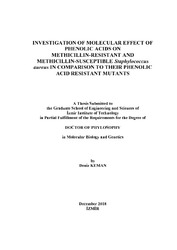Please use this identifier to cite or link to this item:
https://hdl.handle.net/11147/7170| Title: | Investigation of Molecular Effect of Phenolic Acids on Methicillin-Resistant and Methicillin-Susceptible Staphylococcus Aureus in Comparison To Their Phenolic Acid Resistant Mutants | Other Titles: | Metisiline Dirençli ve Metisiline Duyarlı Staphylococcus Aureus'larda Fenolik Asitlerin Moleküler Etkisinin Fenolik Asitlere Dirençli Mutantlarıyla Karşılaştırılarak Araştırılması | Authors: | Keman, Deniz | Advisors: | Soyer, Ferda | Keywords: | Staphylococcus aureus Antimicrobial agents Antimicrobial activity Proteomics |
Publisher: | Izmir Institute of Technology | Source: | Keman, D. (2018). Investigation of molecular effect of phenolic acids on methicillin-resistant and methicillin-susceptible Staphylococcus aureus in comparison to their phenolic acid resistant mutants. Unpublished doctoral dissertation, Izmir Institute of Technology, Izmir, Turkey | Abstract: | Staphylococcus aureus is a Gram-positive bacterium whose acquisition through an open wound results in various infections. Methicillin-resistant S. aureus (MRSA) and methicillin-susceptible S. aureus (MSSA) strains are responsible for diseases ranging from soft tissue infections to fatal pneumonia which cannot be treated due to multiple drug-resistances of these strains. This situation increases the importance of searching for alternative antimicrobials worldwide. Having all these in mind, the capacity of phenolic acids cannot be denied to be used against pathogenic bacteria. Phenolic acids produced as plant secondary metabolites show antibacterial effects besides many beneficial properties for human health. The aim of this study was to investigate the antibacterial action mechanisms of vanillic acid and 2-hydroxycinnamic acid on MRSA and MSSA. To achieve this, firstly the antibacterial effects of phenolic acids on both bacteria were investigated by determination of minimum inhibitory concentrations. Then, the resistance development ability of bacteria against phenolic acids was tested by continuous exposure to subinhibitory concentrations. Finally, the action mechanisms of phenolic acids on bacteria were elucidated using two different proteomic approaches. According to the results, bacteria were not able to develop resistance against phenolic acids. Proteomic studies displayed alterations in the protein profiles of phenolic acid treated bacteria and provided potential targets in the battle with pathogenic bacteria. By showing the inability of MRSA and MSSA to develop resistance to phenolic acids and the important proteomic alterations that are induced by phenolic acid treatment, this study highlights the significance of phenolic acids to be used against antibiotic-resistant bacteria. Staphylococcus aureus, açık yara yoluyla vücuda girmesi sonucu çeşitli enfeksiyonlara sebep olan Gram-pozitif bir bakteridir. Metisiline dirençli S. aureus (MRSA) ve metisiline duyarlı S. aureus (MSSA) suşları, birçok ilaca karşı dirençli olmalarından dolayı tedavi edilemeyen, yumuşak doku enfeksiyonlarından ölümcül zatürreye varan hastalıklardan sorumludurlar. Bu durum, tüm dünyada, alternatif antimikrobiyal arayışının önemini arttırmaktadır. Tüm bunlar düşünüldüğünde, fenolik asitlerin hastalık yapan bakterilere karşı kullanılma potansiyeli yadsınamamaktadır. Bitki ikincil metabolitleri olarak üretilen fenolik asitler, antibakteriyel etkilerinin yanında insan sağlığına yararlı özellikler göstermektedirler. Bu çalışmanın amacı, vanilik asit ve 2-hidroksisinamik asidin MRSA ve MSSA üzerine antibakteriyel etki mekanizmasını araştırmaktır. Bu amaçla öncelikle, fenolik asitlerin her iki bakteri üzerine antibakteriyel etkileri, minimum inhibe edici konsantrasyonlarının belirlenmesi yoluyla incelenmiştir. Daha sonra, bakterilerin fenolik asitlere karşı direnç geliştirme kabiliyeti, sürekli olarak inhibe edici olmayan konsantrasyonlara maruz bırakılmaları yoluyla test edilmiştir. Son olarak, fenolik asitlerin bakteriler üzerindeki etki mekanizmaları iki farklı proteomik yaklaşım kullanılarak değerlendirilmiştir. Sonuçlara göre, bakteriler fenolik asitlere karşı direnç geliştirememiştir. Proteomik çalışmalar, fenolik asitlerle muamele edilen bakterilerin protein profillerinde, hastalık yapan bakterilerle mücadelede potansiyel hedef olabilecek değişiklikleri ortaya çıkarmıştır. Bu çalışma, MRSA ve MSSA’nın fenolik asitlere karşı direnç geliştirememesi ve fenolik asit uygulaması ile tetiklenen önemli proteomik değişiklikleri göstererek, fenolik asitlerin antibiyotiklere dirençli bakterilere karşı kullanılabilmelerindeki önemini vurgulamaktadır. |
Description: | Thesis (Doctoral)--Izmir Institute of Technology, Molecular Biology and Genetics, Izmir, 2018 Includes bibliographical references (leaves: 157-164) Text in English; Abstract: Turkish and English |
URI: | https://hdl.handle.net/11147/7170 |
| Appears in Collections: | Phd Degree / Doktora |
Files in This Item:
| File | Description | Size | Format | |
|---|---|---|---|---|
| T001849.pdf | DoctoralThesis | 4.2 MB | Adobe PDF |  View/Open |
CORE Recommender
Page view(s)
352
checked on Apr 21, 2025
Download(s)
160
checked on Apr 21, 2025
Google ScholarTM
Check
Items in GCRIS Repository are protected by copyright, with all rights reserved, unless otherwise indicated.